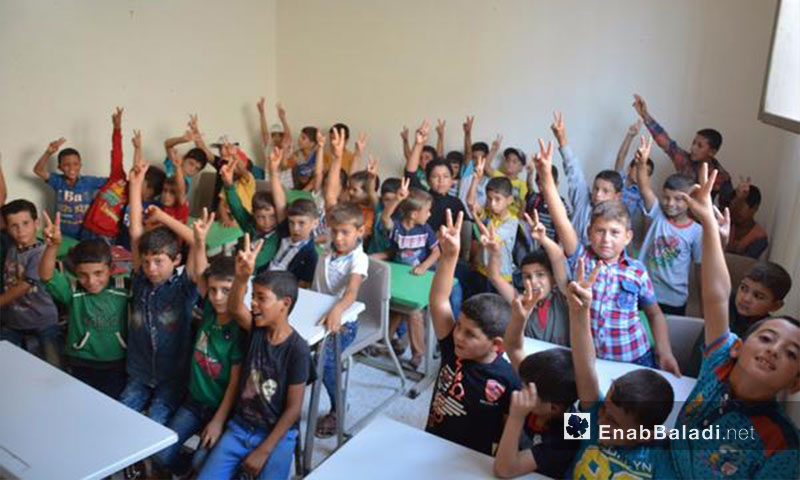A few kilometers from the shelling, which destroyed schools and vital facilities in the countryside of Idlib, a city in northwestern Syria, children are running in the courtyard of the school located in Ataa’s First Residential Complex. The school was first opened at the beginning of the school year, on 16 September 2017.
“Being the largest in the region, the school had to be opened within the Residential Complex,” according to Ahmad Al-Shami, the Educational and Administrative Director of Ataa Schools in Syria, who told Enab Baladi that “the school presents the different stages of education (elementary, secondary and high school), in two separate buildings designated for male and female students”.
The school accommodates more than 3,000 students, who live in the Residential Complex and outside it, according to Al-Shami, who explained that Ataa’s Educational Office has stopped the enrollment process for the student’s number approached the 1.000, referring to “the lack of sufficient financial resources offered by international organizations”.
A teaching staff of 47 male and female teachers runs the school. The Director of the School’s Registration Office pointed out that, since its establishment in 2013, Ataa Association “has expected a future in which education will be playing an important role in the reconstruction of Syria and moved to help Syrian mins to run its schools inside the country”.
The School Adopts the Education Directorate’s Curriculum
The school adopts the curriculum of the education directorates affiliated with the Ministry of the Interim Government; Al-Sahami assured that “Atta Association is not a substitute for the Ministry of Education; rather, it has signed protocols, through which it holds the responsibility of the directorates’ schools, to ensure that the educational process is agreed upon and is following certain regulations”.
Ataa Association depends on these directorates to get teachers for its schools; the Educational Office’s Director pointed out that “the Association subjects the delegated educational staffs to exams which follow scientific standards it had determined in advance”.
Al-Shami invited other educational institutions to support the education of children in Idlib, stressing that the number of enrolled students “will increase in the future to include all those in the region”.
Challenges Facing Schools in Idlib
Abu Ahmad, displaced from Hama, in west-central Syria, enrolled his son in Ataa’s school and told Enab Baladi that the staff deals well with his child, saying that “the school has saved us from sending our son out of the Complex”. He wishes that his son will have the chance to regain what he lost in the past a few years.
Some of the region’s educational staffs, in a survey conducted by Enab Baladi, praised the size of the school being the first of its kind in terms of construction, services and the number of classrooms, but they postponed assessing its educational capacity, saying that “relating to the process of education, we do not know about the school’s capacity yet because it is still new, but it sounds good”.
Last year, the students did not receive their education within the Residential Complex; the teachers described the schools’ situation in the camps’ area as bad, saying that “the buildings and furniture are worn out, which sets the other school, Ataa school, in a totally different category”.
Some parents prefer to send their children to schools in Atmeh, away from the camps, according to certain educational staffs in Idlib, who related this to “the dire situation of children in the camps and the problems that are difficult to control, especially because their children will be having the chance to mix with the Complex’s children in the school”.
It is important to mention that these parents choose Atmeh’s schools because they seek a controlled environment where some of their children’s difficulties might be overcome.
Ataa, an association licensed in Turkey, opened schools in Idlib’s countryside: in Qah, Atmeh and the area surrounding them; in this location a huge mass of people lives. The Association also signed contracts with international organizations to be their representative in running some of the region’s schools.
According to the Association’s statistics, Ataa runs 11 schools inside Syria and six schools in Turkey, which annually gives more than 11.500 male and female students of different educational stages the opportunity to study.

